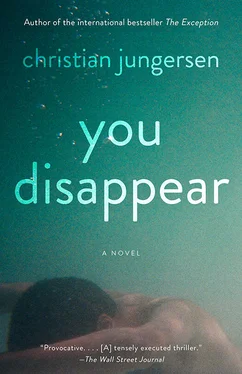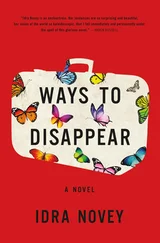“Are you sure?”
“Yes. That’s definitely not the reason.”
“Well, then why did you do it?”
“I don’t know.”
“Do you think you peed on it because you’re sick?”
“Oh no! Are you going to talk about that again?”
“Yes. But you are sick, aren’t you?”
“I know perfectly well that I’m sick! But that has nothing to do with it.”
These days, he’s been saying that his memory has gotten poor since the operation, but it hasn’t. He also thinks the operation has affected his bodily control, and that’s why he falls down the stairs all the time and bruises himself by bumping into everything. In truth, it’s because he runs around the house, fearlessly and all too quickly. But other than those two things, Frederik’s convinced that he’s the same as he’s always been.
• • •
Was Frederik himself two and a half years ago when he came home driving a used orange-red Alfa Romeo? We’d agreed that we should get a new car — but that car? So much extra money for style and speed? That’s something we hadn’t agreed on, and such extravagance wasn’t like him — or me. Back then neither of us had heard about impaired inhibitory mechanisms, much less orbitofrontal syndrome, and we rapidly became fond of the car. Months later, we even got to the point of thinking that Frederik had done exactly the right thing in buying it.
I’m like Vibeke. I can’t stand it either if there isn’t some meaning behind all the strange things that Frederik does.
He’s completely stopped closing windows, doors, cabinets, and jar tops. Our jam jars have all gotten sticky, and one day when I knocked over some gherkins in the fridge, the pickle juice got over everything because he hadn’t screwed the top back on.
I’ve asked several specialists, and they all say there’s no separate system in the brain that controls whether you can close things. There is a directional center, which is often defective in patients with damage to the right temple. But if Frederik’s damage had spread all the way to that region, he’d be having a hard time finding his way around the rooms of the house, he’d unzip his trousers instead of zipping them and start putting his shoes on the wrong feet.
If his recent aversion to closing things isn’t due to brain damage, perhaps we should understand it psychologically — as Vibeke’s therapy teachers doubtless would. Maybe he doesn’t want to close off his possibilities, regardless of whether they lie before him or behind him. Maybe it’s something to do with being unable to stand his present state.
Every minute of the day, I hope that he’s getting to be more like himself again, and so I’m constantly on the lookout for signs. If the sun is shining as I put the last plate in the dishwasher, he won’t lie to me in the next few hours. If the next person who walks past the window has a blue jacket on, Frederik will want to eat a steak like in the old days, not just bread with jam or honey. If the light at the intersection turns green before I pass the parking sign, he’ll say something nice to me of his own volition.
I’ve never been superstitious before. And of course I read more into Frederik than into black cats and ladders, than stars and stoplights. That glint in his eye — isn’t that the old Frederik? The way he looks distractedly into the air as he buttons his shirt, that’s the way he buttoned his shirt when he was well! It’s just like him!
• • •
“The soul is not born, and it is not created. It has always existed, independent of matter and the formation of the universe.” That’s what it said on one of the many odd pages I came across on yet another sleepless night when I googled soul and orbitofrontal .
Was Vibeke yelling at a diseased brain that couldn’t help itself — or at a person with a soul and a sense of responsibility? Can you be responsible if you don’t have a soul? Or can you have a soul without being responsible? Responsible for ruining an entire school? For wrecking your wife’s and son’s lives, for being lewd to your son’s friend?
Yet Vibeke’s anger can hardly compare to me beating him yesterday with the stainless-steel bowl while he lay defenseless underneath me on the floor. I would give anything for the chance to do it over. Last night, I could see that besides the many bruises and swellings he already had, new ones ran up and down his back. He draws me deep into a wilderness of inexcusable behavior, and there’s nothing for me to blame but myself.
Vibeke makes me an open-face cheese sandwich, like I sometimes make for Niklas as comfort food. She places it before me, but I can’t even choke down a mouthful. So she pours tea in my mug and sits down in the armchair.
She fiddles with the amber chain around her neck and the cuffs of her woolen jersey. Once she settles down, she says, “When I look for psychological meaning in his actions, something besides brain damage, it’s also about showing him respect. In nursing, that’s something you always strive for. He’s a human being — much more than just a diseased body. It’s important that you try to listen—”
I’m on my feet before I have the chance to think. “Don’t tell me I don’t show Frederik respect!”
“Pardon me, no, no, Mia. I didn’t mean that at all.”
“You don’t show him any more respect than I do — not with all your silly psychobabble!”
“No, of course not. I don’t—”
I throw the cheese sandwich against the wall. “Get out now! Out! Out!”
“Mia, you can’t just kick everyone out! We’re the only ones who will still come and take care of him.”
Thorkild positions himself in front of Vibeke. As if he’s seen the marks on his son’s back. “Mia, please. Won’t you sit down?”
I can’t. I can’t sit down, I can’t go near Vibeke, I can’t even speak.
“Mia, I would like to have you sit down,” he says again.
Behind him Vibeke is crying, and so I sit down. I sit down slowly while Thorkild remains standing, calm and ready for action, like a retired animal tamer.
“We’re all very angry,” he says. “But we need to stand together. We need to live with the fact that Frederik can no longer love us.”
With theatrically large tears falling upon her cheeks, Vibeke gasps, “It’s so difficult. He doesn’t love me anymore. I feel it all the time. It’s so hard.”
I glance over at Frederik, who’s fallen asleep in his chair.
Vibeke looks at me. “And you must find it hardest of all, Mia. Don’t you? Him no longer loving you?”
• • •
The following day, I explain to Thorkild my thinking about when Frederik stopped being himself. We’re standing in the hallway; he and Vibeke have their coats on and are on their way out the door. They’re actually in a bit of a hurry — they’re going to the emergency room to see if Vibeke might have broken something in her right hand. She maintains that she accidentally struck her knuckles hard against our dinner table.
Thorkild says, “If anything, the opposite is true. Frederik was his real self when he was working sixteen hours a day. Then the tumor started affecting him, and he began getting tired more quickly. And because he wasn’t healthy anymore, he needed to relax with his family. He was most himself when he was working a lot.”
Vibeke’s anxious to get going; her face is twisted in pain.
“Yes, yes,” Thorkild tells her without moving toward the door. Instead he keeps talking to me. “The disease made him weak and turned him into a family man.”
“But the last three years he was the most present he’s ever been — the most normal!”
“I’d think it over again. A judge isn’t going to buy a story about a defendant being himself during the day and then at night being some brain-damaged gambler.”
Читать дальше



![Ally Carter - [Gallagher Girls 01] I'd Tell You I Love You But Then I'd Have to Kill You](/books/262179/ally-carter-gallagher-girls-01-i-d-tell-you-i-lo-thumb.webp)








